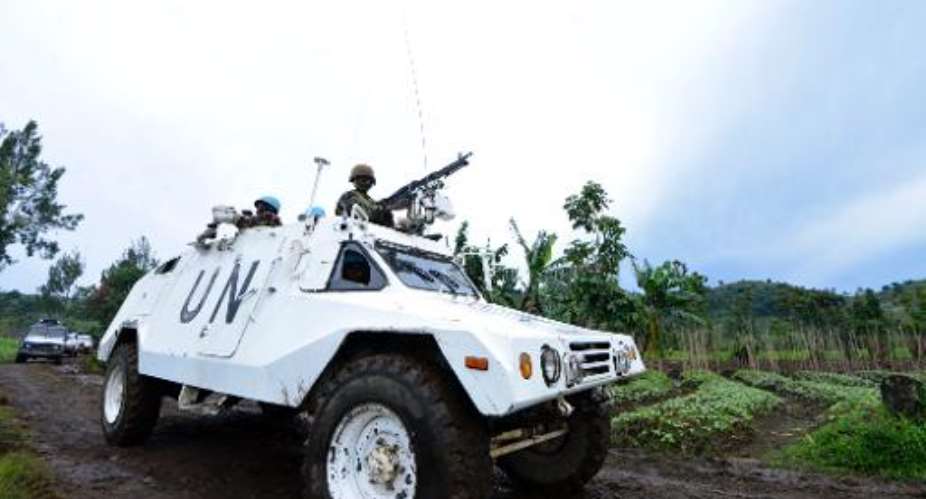New York (AFP) - The United Nations will start using surveillance drones for the first time in Democratic Republic of Congo on Tuesday in a landmark intelligence-gathering advance for the world body.
The unmanned aircraft will be used to monitor the volatile border between DR Congo and Rwanda and movements by militias and armed groups in a region stricken by three decades of conflict.
The United Nations has a huge peacekeeping mission in DR Congo, and other missions and countries are eagerly watching the first international spy drones in the hope that their use will be extended.
UN peacekeeping chief Herve Ladsous is in Goma, the major city in eastern Congo, to "preside over the launch of unarmed, unmanned aerial vehicles" on Tuesday, UN spokesman Martin Nesirky said.
The drones, Nesirky added, would be "an important tool to assist the mission in fulfilling its mandate to protect civilians."
The mission will start with two of the spies in the sky, built by Italian firm Selex ES, a subsidiary of the Italian giant Finmeccanica, UN officials said.
Up to five could be in operation after trials are completed, they added.
General Carlos Alberto Dos Santos Cruz, military commander of the UN mission, MONUSCO, said last month there would be 24-hour drone surveillance in place by March or April.
The vast mineral-rich region is at the heart of a zone where millions have died in conflict over the past decades.
The United Nations formed a 3,000-strong intervention brigade this year to operate in eastern Congo with a special "offensive peacekeeping" mandate.
This has drastically changed the UN mission alongside the looming shadow of the unarmed surveillance vehicles.
UN troops supported DR Congo forces who beat M23 rebels last month.
UN experts say the rebels were supplied and backed by neighboring Rwanda. The Kigali government denies the charge but has given only reluctant support to the use of the drones which could spot any arms crossing one of DR Congo's borders.
The Congo government and UN officials say that the next target in the region is the Democratic Forces for the Liberation of Rwanda (FDLR), which is made up of ethnic Hutu rebels, some of whom are accused of taking part in Rwanda's 1994 genocide of ethnic Tutsis.
The drones will also be able to monitor the movements of armed groups in the vast territory.
The Ivory Coast government has already said it would like the UN to use the surveillance drones to monitor its borders. The commanders of other peacekeeping missions, such as in South Sudan, have also said they would like to see drones used there.
Intelligence is taking a higher profile throughout the UN peacekeeping system which has traditionally relied heavily on information provided by host governments as it sought to preserve neutrality.
Mali has also been mentioned as a possible territory for UN aerial surveillance. And a decision announced by the Netherlands this month to send dozens of intelligence operatives to Mali has also been hailed as a breakthrough for UN peacekeeping.
The Dutch experts will be part of a 380-strong contingent that marks a return of non-French European forces to African peacekeeping.
The Dutch unit will concentrate on electronic spying on the Islamic militants who sought to take over Mali this year, diplomats said.
"They will also engage in traditional espionage through human contacts. It is really a necessary change for the UN," said one UN diplomat concentrating on military affairs.





 Former Kotoko Player George Asare elected SRC President at PUG Law Faculty
Former Kotoko Player George Asare elected SRC President at PUG Law Faculty
 2024 elections: Consider ‘dumsor’ when casting your votes; NPP deserves less — P...
2024 elections: Consider ‘dumsor’ when casting your votes; NPP deserves less — P...
 You have no grounds to call Mahama incompetent; you’ve failed — Prof. Marfo blas...
You have no grounds to call Mahama incompetent; you’ve failed — Prof. Marfo blas...
 2024 elections: NPP creates better policies for people like us; we’ll vote for B...
2024 elections: NPP creates better policies for people like us; we’ll vote for B...
 Don’t exchange your life for wealth; a sparkle of fire can be your end — Gender ...
Don’t exchange your life for wealth; a sparkle of fire can be your end — Gender ...
 Ghana’s newly installed Poland train reportedly involved in accident while on a ...
Ghana’s newly installed Poland train reportedly involved in accident while on a ...
 Chieftaincy disputes: Government imposes 4pm to 7am curfew on Sampa township
Chieftaincy disputes: Government imposes 4pm to 7am curfew on Sampa township
 Franklin Cudjoe fumes at unaccountable wasteful executive living large at the ex...
Franklin Cudjoe fumes at unaccountable wasteful executive living large at the ex...
 I'll 'stoop too low' for votes; I'm never moved by your propaganda — Oquaye Jnr ...
I'll 'stoop too low' for votes; I'm never moved by your propaganda — Oquaye Jnr ...
 Kumasi Thermal Plant commissioning: I pray God opens the eyes of leaders who don...
Kumasi Thermal Plant commissioning: I pray God opens the eyes of leaders who don...
